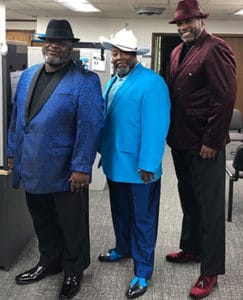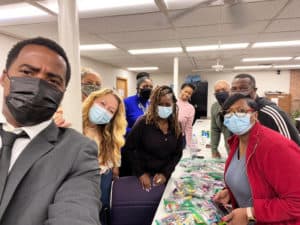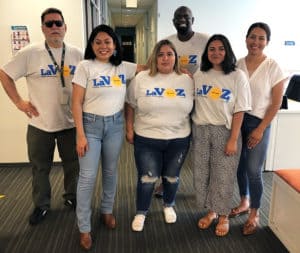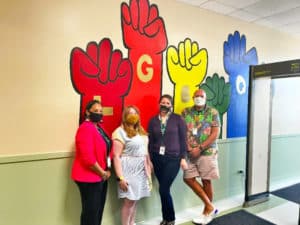For Chicago-based UCAN, DEI is a Way of Living and Working

Increased awareness in societal racism due to recent racist-based killings has led many organizations to examine how best to work for an antiracist society. For example, CHHSM and many of its member agencies have developed and committed to new Diversity, Equity, and Inclusion (DEI) strategies for just that goal. But at CHHSM member UCAN in Chicago, that work has been going on for almost two decades.
UCAN primarily serves African-American and Latinx youth and families across Illinois, and impacts more than 21,000 at-risk children, youth and families each year. In 2003, as part of its new strategic plan, UCAN asked the question, “What do we want the UCAN of the future to look like?” As a partial answer, the organization knew it wanted to emphasize diversity as a means of improving both the organization itself and the wider community.
Initially, says Claude A. Robinson Jr., “We focused on being culturally competent.” The concept of equity became part of the equation in 2008, and in 2010, inclusion was added to the focus. UCAN’s early equity efforts centered on economic equity and diversity among its suppliers, Robinson says. As part of that initial strategic plan, UCAN established a supplier diversity program with goals and accountability built in.
The supplier diversity program includes prioritizing the alignment of UCAN’s strategic goals and spending with businesses owned by people of color and women. To that end, between 2009 and 2021 UCAN spent more than $45 million with businesses owned by people of color and/or women. That includes the 7-acre Drost Harding campus in the North Lawndale neighborhood of Chicago, which is home to several nonprofit and government health and human service agencies.
Today, UCAN’s DEI Strategic Initiative includes nine components: employee resource groups, supplier diversity, leadership commitment, employee development, community engagement, a diversity committee comprised of employees to advance the direction of DEI work, a diversity advisory board comprised of outside experts and governance board members, client programming, and agency assessment.

“The initiative is designed to operationalize DEI internally and externally, and have it woven throughout every aspect of UCAN,” says Robinson. “There is a strong data component behind everything we do. We create 15-25 goals each year — with an accountability framework associated with it — and everyone has a say-so in making sure we are successful.”
Of the nine facets of implementation, the employee resource groups (ERG) have perhaps the most obvious impact. Currently, there are 11 groups. All are employee inspired, and include staff and leadership team members who are expected to be active, contributing members.
These voluntary, employee-led groups are created based on such shared characteristics and demographic factors as gender, ethnicity, sexual orientation/gender identity, and life experiences. Each group sponsors events — sometimes internally, and sometimes in the wider community The groups also provide a space where employees can grow, learn and serve while advancing the mission of DEI in UCAN, says Bianca Cotton, UCAN’s DEI Coordinator. According to UCAN data, some 95 percent of employees who attend ERG events feel DEI is relevant to their work, and 98 percent agree that ERG events improve DEI competence.
Often, the impact of the ERGs is obvious. In the past year, the Pride Alliance ERG spearheaded efforts to help UCAN earn the Human Rights Campaign’s “All Children-All Families” accreditation. It earned the “Building Foundation for Inclusion Tier of Recognition from the HRC in 2021, and was nationally recognized as an All Children-All Families 2021 Change-Maker. To achieve the accreditation, UCAN conducted an internal self-assessment, provided development to staff, and implemented ACAF’s “Benchmarks of LGBTQ Inclusion,” which track policy and practice changes within the agency.

One ERG, La Voz, restarted last year after a dormant period. La Voz is comprised of Latinx employees, and held a kick-off event outdoors for everyone, complete with local chefs, music, and more. “We are a majority African-American organization, and some non-African-American populations can feel that they are not as recognized,” says Cotton, but this event helped to change that. “Our Latinx staff felt proud and SEEN,” she adds.
UCAN’s DEI efforts also led to a book group about racism geared to white staff who wanted to change the biases and ideas around racism. Participants read White Supremacy and Me by Layla Saad, and participated in a facilitated discussion about what they learned.
“One of the reasons it was successful is because it was staff led,” says Robinson. The group learned how people with white privilege benefit from the pain and suffering of Black, Indigenous and People of Color (BIPOC). It helped them learn how to talk about race among their peers and with their team members in order to formulate plans for eradicating racism and racist practices. Participants addressed white privilege, white fragility, tone policing, white silence, color blindness, anti-blackness, racist stereotypes, cultural appropriation, and more.
The group made a presentation to UCAN’s middle management team and its executive leadership team before moving forward, and received support and commitment from both. As a result, white-identifying executive staff brought in an external expert in white caucus work to specifically guide them for six months. The expert met one-on-one with the white executives, as well as in a group format.
The onset of the COVID-19 pandemic created a change in how many faith-based nonprofits, including UCAN, completed its work. But it hasn’t stopped UCAN in continuing forward with its DEI initiative. A virtual DEI Event Speaker Series was introduced in March 2020 to raise and discuss DEI issues. To date, more than 75 sessions have been held for staff, community partners, and interested individuals. “A Conscious Call for Cultural Solidarity” in September 2020, for example, included a panel of experts discussing how to build cultural solidarity between African-American and Latinx cultures, which often have been pitted against each other.

The series has been key in helping to keep connections with partner agencies and the community. “There’s so much happening in opposition to anything related to DEI in the country,” says Robinson. “We keep our finger on the pulse and stay focused on not only working well but also on how we will continue to fight for equity and justice for those we serve.”
To date, UCAN’s DEI Event Speaker Series has reached more than 8,000 people, with new offerings slated for 2022.
“The fact that diversity, equity and inclusion are well-known cornerstones at UCAN speaks volumes about the way we conduct ourselves, how we support the youth and families we serve, the lens through which we view our community partners, and the importance we place on supplier diversity, says Christa Hamilton, UCAN president and CEO. “DEI is woven into the fabric of UCAN’s business model and, as CEO, I am both proud and energized to lead an agency that understands and demonstrates the value of respecting and accepting people from all walks of life. The power of potential we espouse for our youth and families can only be realized when we uplift the differences everyone brings to the table.”
DEI Coordinator Cotton says she finds the UCAN’s DEI initiative a source for positive change. “What is inspiring and encouraging is [that] people who work here, who choose to come here, are not afraid to share what they think because of the culture that has been created here,” she says. “This is not always the case, especially in marginalized communities who often feel they don’t have a voice.”
Robinson agrees. “We’ve continued to stay focused and intentional about the work of DEI and have identified opportunities and ideas to help UCAN stay vibrant in this space and the culture,” Robinson says. “Those things are what is inspiring to me. We keep working. It’s a regular part of the business, the conversations we have.”
Something occurs, like the George Floyd protests that happened in May 2020, Robinson adds, “and it shakes the core of American, and people start to say, ‘What should I do?’ For us at UCAN, we ask, ‘How do we react and continue to evolve and get better?’”
DEI “is more than a policy,” he says. “It’s how we work at UCAN.”
Join Our Mailing LIst
"*" indicates required fields
Follow on Facebook
IFM Community Medicine Clinics Give Children in St. Louis a ‘Head Start’ - CHHSM
www.chhsm.org
IFM Community Medicine serves its St. Louis community by taking healthcare services directly to points of need, overcoming access barriers related to cost, transportation, language, and trust. The maj...